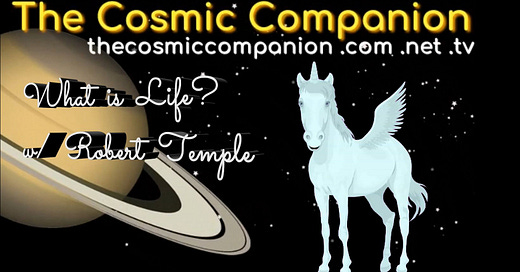What is Life? That's not an easy question to answer. We're going to do our best, talking with Robert Temple, author of A New Science of Heaven, in our first-ever mostly-fully-animated episode!
Hello everyone!
This week on The Cosmic Companion, we're delving into one of the most profound questions in the Universe: What is Life? Later in the show, we will be talking with Robert Temple, author of A New Science of Heaven.
So - What is life? That's a tricky question to answer because life can manifest in so many different ways. It's not always easy to pin down exactly what it is. Does it grow, make more little beings like itself, or have the ability to repair its body after a night of indulging in ice cream and Netflix? Well, maybe not the last one.
Listen to the podcast here, or watch this episode as a video!
[How do we tell the difference?]
I’m glad you asked! There is no certain answer, but in order to distinguish life from non-life, we can look at what it does. Life reproduces, can repair damage to itself, and usually has some form of movement, whereas non-life just sits around collecting dust. However, there are exceptions, like Oregon’s Humongous Fungus, which covers almost 10 square kilometers or 2400 acres, making it the largest organism in the world. Yet it doesn’t move around a whole lot.
[He’s still a fungi!]
Then there are viruses, which are not even cells, but rather bits of genetic material wrapped in coats of protein. While they can reproduce and evolve, they can’t do anything without a host cell, seeming to be both alive and not alive, kind of like zombies.
[ZOMBIE GOOODDD!]
And what about synthetic bacteria, designed by human researchers? They meet many of the criteria for life as we know it. Yet, they are not products of natural evolution, which many researchers hold as a prerequisite for life. Or, maybe synthetic bacteria are kind of like Frankenstein’s monster: alive but not quite normal either.
[FRANKENSTEIN GOOODDD!]
Crystals can grow and form patterns, but they do not consume material or excrete waste, much less move, and so are not typically classified as living beings.
[CRYSTAL SOUNDS]
Like crystals, fire — a form of plasma — can seem alive, but fire doesn’t have cells, or genetic material. But — could mindboogling vast storehouses of plasma born from energy of powerful young stars within behemoth clouds of gas and dust be complex enough to network into something we call life?
Next up, we discuss that very question with Robert Temple, the author of A New Science of Heaven.
Within the realm of science fiction, we’ve seen androids and robots like Data from Star Trek or WALL-E from Pixar films that appear much like biological life, demonstrating the power of storytelling to explore what it means to be alive.
Generative artificial intelligence, including Chat-GPT, has recently made rapid advancements in this field. Some futurists now speculate that machines could soon possess qualities of biological life, raising big philosophical questions about consciousness and sentience, as well as the ethical implications of creating and interacting with non-biological life forms.
There are those who argue that artificial intelligence should not be considered “alive” since machines still rely on human programming to function properly. However, with new technologies allowing robots to learn from experience and massive data sets, it becomes increasingly difficult to deny them some recognition as living entities.
Maybe life is more diverse and mysterious than we can imagine. Perhaps there are forms of life that we can’t detect or comprehend with our current tools and theories. Understanding these new forms of life could soon make us question our own existence and place in the universe.
Next week, we’ll be joined by physics professor Nicolle Zellner from Albion College as we tell you the stone-cold truth about moon rocks. Make sure to tune in for that episode, coming on 1st April — no kidding!
If you enjoyed this week’s episode, be sure to follow, share, subscribe, and tell your friends about the show. You can find us any time at TheCosmicCompanion.net. Subscribe to our newsletter at TheCosmicCompanion.com and never miss an episode.
Until next time… Clear skies!
James













Share this post